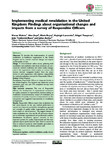Implementing medical revalidation in the United Kingdom: Findings about organisational changes and impacts from a survey of Responsible Officers
| dc.contributor.author | Walshe, K | |
| dc.contributor.author | Boyd, A | |
| dc.contributor.author | Bryce, Marie | |
| dc.contributor.author | Luscombe, Kayleigh | |
| dc.contributor.author | Tazzyman, A | |
| dc.contributor.author | Tredinnick-Rowe, JF | |
| dc.contributor.author | Archer, Julian | |
| dc.date.accessioned | 2017-01-19T16:47:33Z | |
| dc.date.accessioned | 2017-08-10T11:11:12Z | |
| dc.date.available | 2017-01-19T16:47:33Z | |
| dc.date.available | 2017-08-10T11:11:12Z | |
| dc.date.issued | 2017-01 | |
| dc.identifier.issn | 0141-0768 | |
| dc.identifier.issn | 1758-1095 | |
| dc.identifier.uri | http://hdl.handle.net/10026.1/9722 | |
| dc.description.abstract |
<jats:sec><jats:title>Objective</jats:title><jats:p> To describe the implementation of medical revalidation in healthcare organisations in the United Kingdom and to examine reported changes and impacts on the quality of care. </jats:p></jats:sec><jats:sec><jats:title>Design</jats:title><jats:p> A cross-sectional online survey gathering both quantitative and qualitative data about structures and processes for medical revalidation and wider quality management in the organisations which employ or contract with doctors (termed ‘designated bodies’) from the senior doctor in each organisation with statutory responsibility for medical revalidation (termed the ‘Responsible Officer’). </jats:p></jats:sec><jats:sec><jats:title>Setting</jats:title><jats:p> United Kingdom </jats:p></jats:sec><jats:sec><jats:title>Participants</jats:title><jats:p> Responsible Officers in designated bodies in the United Kingdom. Five hundred and ninety-five survey invitations were sent and 374 completed surveys were returned (63%). </jats:p></jats:sec><jats:sec><jats:title>Main outcome measures</jats:title><jats:p> The role of Responsible Officers, the development of organisational mechanisms for quality assurance or improvement, decision-making on revalidation recommendations, impact of revalidation and mechanisms for quality assurance or improvement on clinical practice and suggested improvements to revalidation arrangements. </jats:p></jats:sec><jats:sec><jats:title>Results</jats:title><jats:p> Responsible Officers report that revalidation has had some impacts on the way medical performance is assured and improved, particularly strengthening appraisal and oversight of quality within organisations and having some impact on clinical practice. They suggest changes to make revalidation less ‘one size fits all’ and more responsive to individual, organisational and professional contexts. </jats:p></jats:sec><jats:sec><jats:title>Conclusions</jats:title><jats:p> Revalidation appears primarily to have improved systems for quality improvement and the management of poor performance to date. There is more to be done to ensure it produces wider benefits, particularly in relation to doctors who already perform well. </jats:p></jats:sec> | |
| dc.format.extent | 23-30 | |
| dc.format.medium | Print-Electronic | |
| dc.language | en | |
| dc.language.iso | eng | |
| dc.publisher | SAGE Publications | |
| dc.relation.replaces | http://hdl.handle.net/10026.1/8266 | |
| dc.relation.replaces | 10026.1/8266 | |
| dc.subject | Professional regulation | |
| dc.subject | medical revalidation | |
| dc.subject | quality of care | |
| dc.subject | appraisal | |
| dc.subject | evaluation | |
| dc.title | Implementing medical revalidation in the United Kingdom: Findings about organisational changes and impacts from a survey of Responsible Officers | |
| dc.type | journal-article | |
| dc.type | Journal Article | |
| plymouth.author-url | https://www.webofscience.com/api/gateway?GWVersion=2&SrcApp=PARTNER_APP&SrcAuth=LinksAMR&KeyUT=WOS:000394956500007&DestLinkType=FullRecord&DestApp=ALL_WOS&UsrCustomerID=11bb513d99f797142bcfeffcc58ea008 | |
| plymouth.issue | 1 | |
| plymouth.volume | 110 | |
| plymouth.publication-status | Published | |
| plymouth.journal | Journal of the Royal Society of Medicine | |
| dc.identifier.doi | 10.1177/0141076816683556 | |
| plymouth.organisational-group | /Plymouth | |
| plymouth.organisational-group | /Plymouth/Faculty of Health | |
| plymouth.organisational-group | /Plymouth/Faculty of Health/Peninsula Medical School | |
| plymouth.organisational-group | /Plymouth/REF 2021 Researchers by UoA | |
| plymouth.organisational-group | /Plymouth/REF 2021 Researchers by UoA/UoA23 Education | |
| plymouth.organisational-group | /Plymouth/Research Groups | |
| plymouth.organisational-group | /Plymouth/Research Groups/FoH - Community and Primary Care | |
| plymouth.organisational-group | /Plymouth/Users by role | |
| plymouth.organisational-group | /Plymouth/Users by role/Academics | |
| dc.publisher.place | England | |
| dc.identifier.eissn | 1758-1095 | |
| dc.rights.embargoperiod | Not known | |
| rioxxterms.versionofrecord | 10.1177/0141076816683556 | |
| rioxxterms.licenseref.uri | http://www.rioxx.net/licenses/all-rights-reserved | |
| rioxxterms.type | Journal Article/Review | |
| plymouth.oa-location | http://journals.sagepub.com/doi/full/10.1177/0141076816683556 |


